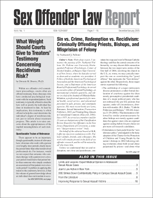Constitutional Standards Demand Due Process Procedures for Offenders to Demonstrate Non-dangerousness
Author: Roslyn K. Myers, Ph.D., J.D..
Source: Volume 21, Number 05, August/September 2020 , pp.67-68(2)

< previous article |next article > |return to table of contents
Abstract:
In 2000 the defendant “John Doe,” in Doe v. Alaska, No. S-16748, No. 7375 (Alas. 2019) was convicted of aggravated sexual battery in Virginia, required to register as a sex offender, and sentenced to a suspended sentence of five years in prison, with five-years of probation. After moving to Alaska in 2003, Doe fulfilled his annual registration requirements, as initially instructed by the Alaska Department of Public Safety (ADPS) until 2005, when he was notified that his registration would be quarterly for life. This new requirement was imposed because a review of his case showed that the Virginia conviction was most similar to an aggravated offense in Alaska, which had more stringent registration requirements. Doe refused to comply with the new requirement, and, in 2007, he was convicted of second-degree failure to register under the Alaska Sexual Offender Registration Act (ASORA), Ch. 41, § 1, SLA (1994). On appeal, the Alaska Supreme Court found ASORA “violative of due process” and to survive scrutiny the Act “must accommodate the constitutional right of sex offenders by offering them the right to a hearing consistent with due process principles under which they may attempt to prove that they are not likely to reoffend.”Keywords: Doe v. Alaska; Alaska Sexual Offender Registration Act (ASORA)
Affiliations:
1: John Jay College.